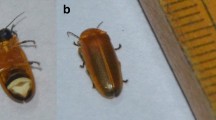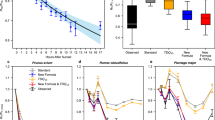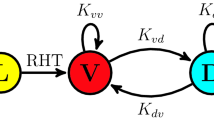Abstract
IT has been shown by Wilkins1,2 that if excised leaves of the succulent plant B. fedtschenkoi are maintained in darkness, at a constant temperature of 26° C. and in an air-stream initially free of carbon dioxide they exhibit a 22.4-hr. rhythm in their rate of output of carbon dioxide. Furthermore, it was found that continuous illumination inhibited the rhythm, which recommenced when darkness was restored. A more detailed investigation of the light inhibition of the rhythm has been made by illuminating leaves for a few hours at various positions in the cycle.
This is a preview of subscription content, access via your institution
Access options
Subscribe to this journal
Receive 51 print issues and online access
$199.00 per year
only $3.90 per issue
Buy this article
- Purchase on Springer Link
- Instant access to full article PDF
Prices may be subject to local taxes which are calculated during checkout
Similar content being viewed by others
References
Wilkins, M. B., Ph.D. thesis, University of London (1958).
Wilkins, M. B., J. Exp. Bot., 10, 377 (1959).
Hastings, J. W., and Sweeney, B. M., Biol. Bull., 115, 440 (1958).
Author information
Authors and Affiliations
Rights and permissions
About this article
Cite this article
WILKINS, M. Effects of Light and Darkness on the Rhythm of Output of Carbon Dioxide of Excised Bryophyllum Leaves. Nature 187, 523–525 (1960). https://doi.org/10.1038/187523a0
Issue Date:
DOI: https://doi.org/10.1038/187523a0
This article is cited by
Comments
By submitting a comment you agree to abide by our Terms and Community Guidelines. If you find something abusive or that does not comply with our terms or guidelines please flag it as inappropriate.



